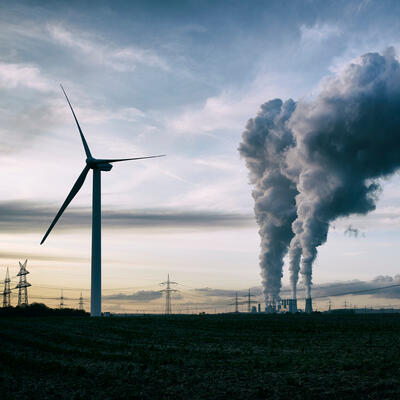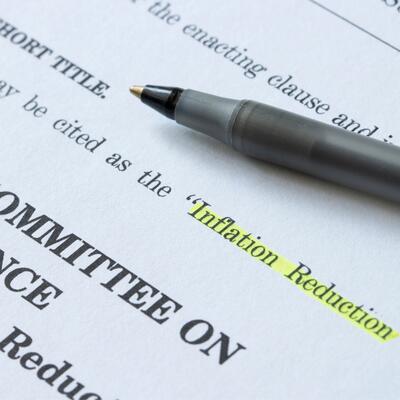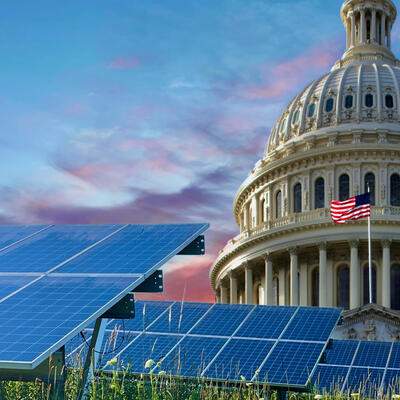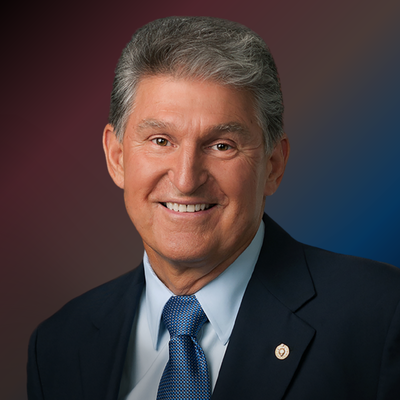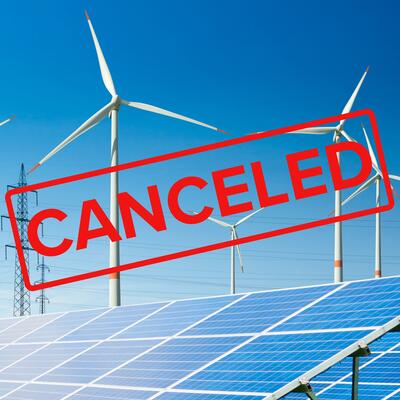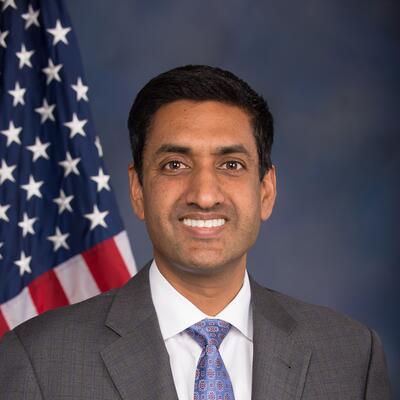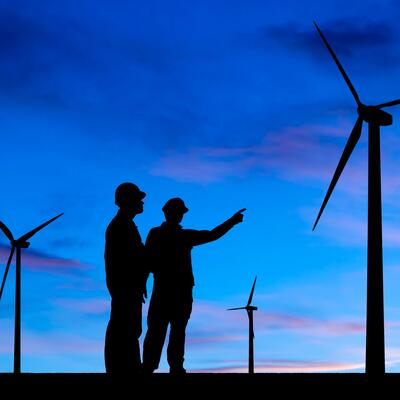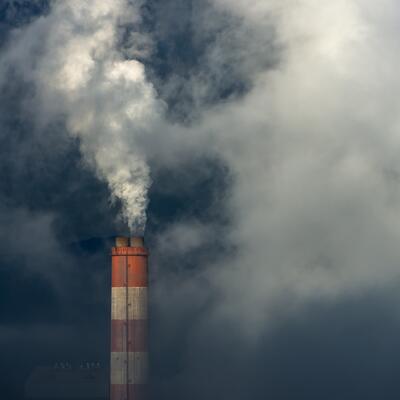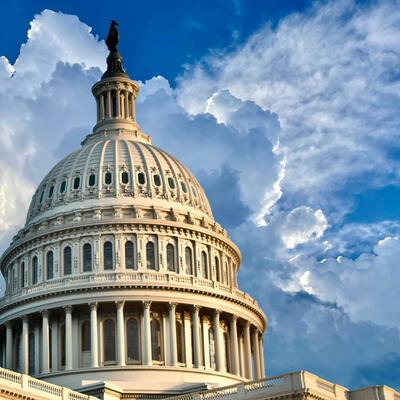
The Inflation Reduction Act: What’s in the Sausage?
Guests

Chelsea Henderson

Sam Ricketts
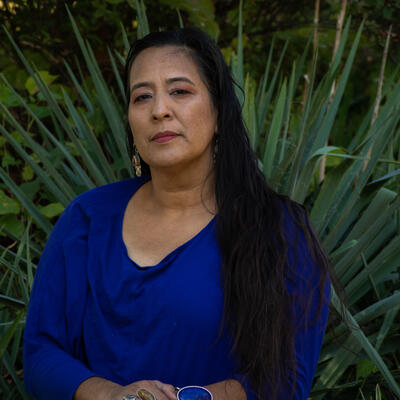
Ozawa Bineshi Albert

Somini Sengupta
Summary
For nearly six decades, the US government passed no comprehensive climate legislation. Now that’s changed. The Inflation Reduction Act contains approximately $370 billion of investments in clean energy and climate solutions. But not everyone is happy. To get through the Senate, the bill offered a lot of carrots to entrenched fossil fuel interests, along with investments in renewable power. And many in disadvantaged communities, who so often bear the brunt of climate-induced disasters, feel they’ve been left out yet again.
The Inflation Reduction Act’s billions go primarily toward investments in clean energy and climate solutions in the electricity sector, transportation, buildings and appliances, sustainable agriculture and forestry, clean manufacturing and industrial decarbonization.
Those investments would help achieve an approximate 40% reduction in greenhouse gas pollution below 2005 levels by 2030, which begins the path towards President Biden’s goal of cutting carbon and greenhouse gas pollution in half by 2030. That said, Sam Ricketts, Co-Founder of Evergreen Action, says that the bill is an imperfect compromise: “It contains bad provisions. Provisions that will contribute more greenhouse gas pollution.” However, he goes on, the projected climate pollution reductions outweigh the projected climate pollution additions by about 24 to one.
For Bineshi Albert, Co-Executive Director of Climate Justice Alliance, the legislation is devoid of anything that would create a real relationship with the communities who are being directly impacted. And that relationship is necessary for addressing unintended consequences of even the best climate policy. “Storage of energy for wind and solar is a concern, because those minerals that are used for batteries and for solar panels, those come from actual places where people live. And so, it's not to say ‘let's not do that.’ I am 100% behind wind and solar and other renewable sources, but how do we share the responsibility so it's not the same communities over and over being sacrificed for that?”
The bill passed the Senate along party lines, with Vice President Harris casting the tie-breaking vote. Yet Senator Manchin had said Republicans would have voted for this in normal times: it pays down the debt; it increases permitting of energy projects; it increases energy production, objectives that Republicans typically seek.
For Chelsea Henderson, Director of Editorial Content at RepublicEn, “The problem is that it was done through this budget reconciliation process, a partisan process, even though it includes things that might be attractive to other Republican lawmakers, is always gonna have that little, you know, you’re pitting the parties against each other.”
Henderson goes on to say, “Even if we stop emitting CO2 today the whole world, we’re still gonna see these impacts of warming, right, because it takes years, decades even longer for the cycle to catch up. And so, I am a little bit afraid that people who aren't paying as close attention will look at this and say, oh, we just didn’t solve climate change. We put all this money into it and when they're still seeing hurricanes, floods, forest wildfires, droughts, then there's gonna be sort of a cynical response: What did we spend all that money on, when all of us here know that it's a little more nuanced than that. We need more of a sustained effort over time, over time, over time, and then maybe my grandkids will start to see a climate that is a little more stable.”
Somini Sengupta, International Climate Reporter & Anchor, Climate Forward Newsletter, New York Times, says this landmark legislation will help the United States address its responsibility to the rest of the world as the largest historic emitter of greenhouse gasses. That said, Sengupta points out that – other than pumping a lot of investment in clean energy that should bring down costs for everyone – the act does nothing to help other countries pay for new renewable energy projects, nor help other countries adapt to the effect of climate change. “That's a big deal because the US remains a laggard in international climate finance. President Biden pledged that the US would give $11.4 billion a year by 2024. So far what we've seen is Congress approving just a mere fraction of that. Congress has approved about $1 billion of that pledge.”
However, Sengupta continues, “It allows the United States, starting with the president and his special envoy, to say ‘we are at the table.’ It is a very different position from one that you saw a few years ago with the US pulling out of the Paris climate agreement” – which President Biden rejoined almost immediately upon taking office.
Related Links:
Climate Forward
RepublicEn
Evergreen Action
Climate Justice Alliance
Full Transcript
Greg Dalton: This is Climate One. I’m Greg Dalton. The negative impacts of burning fossil fuels reached the highest levels of the US government earlier than most people realize.
Chelsea Henderson: The first president to be briefed about climate change was LBJ in 1965. Every president since then has been briefed about the issue.
Greg Dalton: But for nearly six decades, the federal government passed no comprehensive climate legislation. Now that’s changing.
Sam Ricketts: The Inflation Reduction Act contains approximately $370 billion of investments in clean energy and climate solutions.
Greg Dalton: And with the new bill moving toward the President’s desk, the United States has concrete evidence to show the rest of the world that we are indeed taking the climate crisis seriously.
Somini Sengupta: It allows the United States to say “we are at the table.”
Greg Dalton: The Inflation Reduction Act: What’s in the Sausage? Up next on Climate One.
Greg Dalton: This is Climate One. I’m Greg Dalton. Since LBJ was first briefed on climate disruption in 1965, a handful of US Senators have blocked attempts to address it holistically. In 1994, Senator Robert Byrd, Democrat from West Virginia, opposed President Clinton’s plans for a national tax on energy based on output or BTUs. A few years later, Byrd and Chuck Hagel, Republican from Oklahoma, basically killed US ratification of the Kyoto Protocol. In 2009 President Obama and House Speaker Nancy Pelosi got a comprehensive climate and energy bill through the House only to see it die in the Senate. A few years later, the Paris Climate Agreement was structured as a voluntary deal, not a treaty, so it would not have to be ratified by the US Senate. That streak seemed to be continuing when last month Senator Joe Manchin announced he was no longer negotiating on a slimmed-down version of President Biden’s Build Back Better agenda. Two weeks later, Senator Manchin and Majority Leader Chuck Schumer shocked everyone when they announced a surprise deal on energy, taxes and healthcare. Now, for the first time in history, the US Senate has passed significant climate legislation. For those of us who have been following the growing climate crisis for years, the last month has been an especially wild, emotional, intense roller coaster ride.
Chelsea Henderson is Director of Editorial Content at RepublicEn and a former staffer on the Senate Environment and Public Works Committee. She worked for John Warner, Republican Senator from Virginia when he attempted to enact climate legislation. Sam Ricketts is Co-Founder of Evergreen Action and former advisor to Jay Inslee’s presidential campaign. Bineshi [beh-NEE-she] Albert is Co Executive Director of the Climate Justice Alliance and previously the Movement Building Coordinator with the Indigenous Environmental Network.
To get through the Senate, the bill offered a lot of carrots to the fossil fuel and renewable power industries. I asked Sam Ricketts how that balances out.
Sam Ricketts: The Inflation Reduction Act contains approximately $370 billion of investments in clean energy and climate solutions in the electricity sector and in sustainable agriculture, in forestry, advanced clean manufacturing and industrial decarbonization. And clean and more efficient buildings and building appliances and otherwise and electric vehicles and transportation decarbonization. Those investments would help achieve, based on modeling for a number of analyses, an approximate 40% reduction in greenhouse gas pollution below 2005 levels by 2030, which begins the path towards President Biden’s goal of cutting carbon and greenhouse gas pollution in half across the country, across the economy under 2005 levels by 2030. Given this is a 50% reduction this bill will help achieve 40% reduction most of the way there. That said, the bill is a compromise a result of a long painstaking and difficult negotiation between Sen. Schumer, Sen. Manchin and others involved in the Congress, and as such it contains bad provisions, provisions that will contribute more pollution more greenhouse gas pollution certainly the analyses we’ve seen from some of the modeler show the climate pollution reductions associated with climate pollution additions from fossil fuel piece of the bill outweighing by about 24 to 1. So, significant reductions in climate pollution, but really importantly, these provisions offered included in the bill by Sen. Manchin are not just bad because of their climate pollution, they’re bad because of the direct pollution that it will impact communities, their bad because of the fossil fuel extraction that has been ongoing and harming these communities particularly in the provisions we’re talking about we’re gonna be dealing with in the Gulf South and in the Arctic in Alaska but other parts of the country as well. And these provisions will continue harms and not alleviate environmental injustices and environmental racism that has been ongoing for decades. And so, we need to hold both of those truths at this time. That this is a historic bill with transformative investments that are going to drive down climate pollution that are going get a chance to put real economic opportunity and pollution reductions into communities, create good jobs and begin to address the climate crisis at the scale that's necessary. But also, that there is going to be the continuation of extraction and pollution and the work of fossil fuel industries that will continue to harm communities and those things both need to be held at this important moment.
Greg Dalton: Bineshi, what good, bad and ugly do you see in the energy and climate provisions of this big bill?
Bineshi Albert: The way that our political system works is communities’ elect leaders to make these decisions but also with the intention is that there's a direct relationship to those communities. But I say intention because the practice is not always the same, right. And so, you have a bill like this that has a lot of what could reduce greenhouse gasses and what's there but is also devoid of like real relationship to the communities who are being directly impacted. We call those frontline communities and frontline being those who are dealing with the harms of the climate crisis and have been dealing with them for decades, right. Those in Alaska and the Gulf South folks were dealing with extreme drought, wildfires. Like these are accumulation of like impacts of climate change and communities have been dealing with them for a long time. Additionally, those communities who live along the fence line of polluting industries we also call frontline communities. Those frontline communities in our political process often don't get consulted. There are pockets that happen every now and then. But by and far like what is there is devoid of like real community input of like here's how this can be helpful for us. So, I'll say that first. In terms of the harms, right, even though like there's plenty of stuff there that like, you know, climate justice environmental justice communities have long fought for. There's also a lot of stuff that just you know makes it easier for further expansion of oil and gas development that ties some renewable energy development, oil and gas expansion. And then there's other things in there that are technologies that are about reducing greenhouse gasses, but a lot of times we call some of those solutions false solutions. And we have real criticism about some of those. Nuclear is in there as a clean carbon free energy source. But nuclear is not clean. It's not clean from its whole life cycle, from mining to production to how it uses the energy to the storage of its waste. Like the lifetime of nuclear and its harms to community, you know, far spans our generation. Some of those spent fuel rods are going to remain toxic for hundreds of years beyond this moment, beyond this generation. So, to tout that that’s a clean energy source and to prop that up it's greatly concerning to us.
Greg Dalton: So, it's not transformative; it perpetuates a lot of the power dynamics and things that define our political system. Chelsea, much of the serious debate around climate policy centers on the tools. Should we use government regulation, tax incentives, you know, markets, risk exposure, kind of carrots and sticks. What does this bill rely on?
Chelsea Henderson: Well, obviously this bill makes a historic investment with $370 billion. And, you know, at republicEn.org we would prefer to see a price on carbon as an approach. I’m not gonna say no to $370 billion invested to make progress on climate change. I personally have been working on this issue for about 20 years. And I think collectively between me and Sam and Bineshi, maybe we reach 50 years together having worked on this issue. And so, I have to look at symbolically what it means that we are finally having something that we’ll be able to celebrate, but at the same time as our executive director Bob Inglis would say the work is not done, and obviously there isn't a huge appetite for carbon tax, which is a tool that would put a price on carbon to sort of set some of those market signals. But I really think that we do need to come together and talk about having real codified target timetables, price on carbon just to it’s great that the estimate is 40% reduction by 2030 but we all have been around this block a number of times. And I would hate to see that not achieved because it’s a perceived goal but not a directly stated goal.
Greg Dalton: Bineshi, the House passed the clean electricity performance plan that incentivize power utilities to move to clean electricity and penalize those that didn't. Some utilities that oppose that are lining up behind this new version, including Arizona Public Service and American Electric Power, which delivers power in 11 states. What do you make of that shift that the industry kind of is getting on board behind this? Is that a good sign or is it making you suspicious?
Bineshi Albert: I have may have been at this too long and so those kinds of things make me raise an eyebrow. For sure. Yeah, you know, what is considered clean power is one. So, that term clean is a tricky term. so, yeah, you know the clean energy production credit that is there is good and it sounds good on the front end. You know when you’re reading it, you're like yeah, that's great we want clean energy. But at the same time, you know, some of those technologies that are being used to produce clean energy, you know, pollute in other ways, right. And, like Chelsea, you know, I think there's other approaches that we also need to be taking. For me when I think about the list of technologies and tools that are being put out there that I consider false solutions. Part of that is because all of those have to do with reducing carbon once it's produced. A bill like this is not doing much to say stop producing carbon. As a country, we’re not even remotely close to saying stop producing carbon. This bill along with others, along with lots of other legislation always come from a place of like all right, let's figure how to clean it out of the air once we can. But right now, where we’re at like you know from the communities, we’re experiencing this the crisis that we’re in is we could be cleaning for decades and not get caught up, right. And so, for us to not address the production side in saying we need to tighten up regulations on stop producing so much carbon or, you know, reducing that. We will still be implementing these techno-fixes in a way that are not real solutions but half-gap measures that allow the industry to continue to pollute the way it is. This bill is latent with that it’s laced with that all through the bill.
Chelsea Henderson: I was just gonna say that in my free time ,which I have so much in abundance of, I'm writing a book on the history of politics of climate change sort of looking back mid 70s to the present day. But in conducting the research for this book I was astonished to learn that the first president to be briefed about climate change was LBJ in 1965. Every president since then has been briefed about the issue: we burn fossil fuels, we create carbon dioxide, we're warming the planet. And in that 1965 memo to LBJ they said by the year 2000 if we don't slow down our fossil fuel emissions, we’re going to have sea level rise, more intense storms, drought, heat waves, all the things that 20 years after that we’re experiencing in droves now. And it's been really interesting to sort of look at the history, whether you're a Democrat or a Republican in the White House, you are incentivizing fossil fuels and sometimes also incentivizing clean energy or renewable energy. But to what Bineshi was saying the emphasis has been more on what we do after we make it and not on stopping the source in the beginning. And that does seem to be a missing part of the equation.
Greg Dalton: You’re listening to a conversation about the Inflation Reduction Act, an energy, tax, and healthcare bill . Our podcasts typically contain extra content beyond what’s heard on the radio. If you missed a previous episode, or want to hear more of Climate One’s empowering conversations, subscribe to our podcast wherever you get your pods. Coming up, despite the progress being made, vulnerable communities continue to bear the brunt of the harm from mining and energy production.
Bineshi Albert: I am 100% behind wind and solar and other renewable sources, but also like how do we share the responsibility so it's not the same communities over and over being sacrificed.
Greg Dalton: That’s up next, when Climate One continues.
Greg Dalton: Krysten Sinema was the last Democratic Senator to support the climate and tax bill. In order to get her vote, the democratic leadership dropped a provision that would have closed the carried interest tax loophole, which mostly benefits wealthy hedge fund and private equity managers. I asked Sam Ricketts how big a compromise that was.
Sam Ricketts: Well, look, the bottom line is she's on board now, right. There have been back and forth on the pay fors, the revenue provisions, the climate provisions and otherwise in this bill for 18 months. It has been a long slog. A number of pieces both inside of the climate space and outside on the revenue things have been toggled over have been offered up and then backtracked on where they are now. The bottom line is where they’re at. They’ve got to set a pay-fors they’ve got the investments. They’ve got the good and the bad when it comes to the climate provisions. They got other pieces in the bill like an important provision to help Americans save money on their prescription drug costs. And this will be a major moment and a starting point to the point of the conversation we’re having here. This doesn't solve any one problem. It doesn’t solve the climate challenge. This is the beginning of with major investments in the communities that’s gonna need to be bird-dog and pay attention to and the implementation is going to be everything. But this is in other words somewhat like a starting gun for a race that's going to be hopefully define the coming decade of building something better. Building a more just, a more inclusive, more sustainable clean energy economy that actually bends down carbon pollution and toxic pollution in communities that turns the tide on formerly a 20th century fossil fuel powered economy to a clean renewable power economy for the future. That can have less pollution, less premature death, less kids growing up with asthma, more good union jobs, right, more economic opportunity. That's the future in front of us that this bill doesn't entirely deliver – this bill is a part of the path towards. And to be clear there’s going to need to be other tools we’re talking here about some of the other things that were either left out of the bill or need still yet to be done, right. The president and the executive and the federal government needing to use bold executive action to get after the sources of pollution through the Clean Air Act and otherwise. There’s gonna need to be continued leadership from states, states, local governments and communities have been basically road testing a number of the policies that are brought forward here by Congress. But they can't slow down. That's not a sideshow; that's a central part of what needs to continue to happen to. States continue to take a leadership on zero emission buildings on getting pollution on transportation and the power sector and the like. So, lot still yet to be done. This bill is a major inflection point though and provides an opportunity with these investments to grease the skids for this all going faster and in the right direction.
Greg Dalton: Chelsea, Sen. Manchin had said Republicans would vote for this in normal times, it pays down the debt it increases permitting of energy projects increases energy production, those things that Republicans typically seek. And yet Americans for Prosperity, part of the Koch political network, ran ads on social media urging Joe Manchin and Kyrsten Sinema to oppose this bill. So, what do you make of it would this be something the Republicans in normal times would support?
Chelsea Henderson: Well, I think the problem is that it was done to this budget reconciliation process. So, a partisan process, even though it includes things that might be attractive to other Republican lawmakers is always gonna have that little, you know, you’re pitting the parties against each other. And we definitely would prefer to see this be bipartisan. If you want durability in what you're trying to do there has to be bipartisanship. But then the truth of the matter is there aren’t 10 extra votes to do this outside the budget reconciliation process. So, there's no 60 votes right now for one thing on climate change in the Senate. So, I wish that this could come about differently but I understand that this is the mechanism that these were the tools that were available to get the bill done.
Greg Dalton: Right. So, when you say durability does that mean that the Republicans are going to spend the next few years attacking and trying to undo this thing like did Obama care?
Chelsea Henderson: One can only imagine. And, you know, it's always tricky I mean at least with the difference between a bill like this and say like the Clean Power Plan is that this is real money it's going to be spent out and nobody can take those dollars back whereas subsequent presidents you could always rollback a regulation. So, and that since there is I guess a little bit of durability baked in. One thing that I worry about is and Bineshi was saying this, the climate impacts are baked in now, right. So, even if we stop emitting CO2 today the whole world, we’re still gonna see these impacts of warming, right, because it takes years, decades even longer for the cycle to catch up. And so, I am a little bit afraid that people who aren't paying as close attention will look at this and say, oh, we just didn’t solve climate change. We put all this money into it and when they're still seeing hurricanes, floods, forest wildfires, droughts, then there's gonna be sort of a cynical response: what did we spend all that money on when all of us here know that it's a little more nuanced than that. We need more of the sustained effort over time, over time, over time and then maybe my grandkids will start to see a climate that is a little more stable.
Greg Dalton: Yeah. The scale of that. That’s a good point. I hadn't thought of that. They’re like hey, we spent that money didn’t we fix it? Bineshi, President Obama famously focused on healthcare and never got a climate bill through the Senate. This bill combines healthcare, taxes, climate and energy. What do you make of the packaging of the issues and the way it’s being presented to the public?
Bineshi Albert: President Biden, you know, ran on a campaign that included like this is gonna be one of his main priorities, That leaves communities like optimistic and still slightly skeptical. And so, for me, no matter what happens with this Inflation Reduction Act I still think President Biden needs to declare a climate emergency. I think that needs to happen, right. Because one it sets agencies in a different pathway to say we need to look at this in a different way. It sets industry in a different pathway that we need to address things in a different way. And it says to communities, hey, I am taking serious the concerns, the impacts and the harms that are happening and I want to make sure something happens quickly. But also, what it does for world leadership is to say, hey, this is the pace, this is the urgency that we need to be moving with. And right now, I’m trying my best to remain hopeful that President Biden will do that because in all honesty like in hearing him talking in the campaign like I thought that would be something that would have been you know right out the gate. And instead, you know, I think he is tied like many other presidents before, President Obama included, we live in a country whose history, whose history is wound up and wrapped up into oil and gas development. Our economy is so intertwined with oil and gas development. I live in Oklahoma, I'm from Oklahoma. I am in the belly of the beast in oil and gas country, right. We have sports teams who are called Oilers and Drillers like this is how ingrained this is in our culture which does then mean that our political, like even our political system helps facilitate that and maintain that. And for the communities here in Oklahoma who are dealing with the harms of living along oil refineries who are like spewing out different burnoffs at night and they’re like seeing that on their vehicles and on their grass. Communities in Texas who can light their lawns, communities in Alaska who are losing land whole villages slipping into the sea because of sea level rise, right. Hurricanes in the Gulf South, like people are dealing with the stuff in a long time and they are very clear how they want to see like aggressive urgent action happen because they're dealing with harms and loss of life today. Not in the future, and I think you know I feel like the response that we’re getting is you know like that proverb of like putting a frog in a pot and sending it to boil, right. Climate change people's responses have been that way because it isn’t an abrupt thing but a gradual thing. People have come to accept, oh well, the new normal is that we have more increased intense tornadoes or wildfires or drought and across the world like that has now become like all right well, that happened; there's going to be wildfires in California every year and people accept that.
Greg Dalton: It’s amazing how quickly humans can kind of like shrug and you know sort of accept fires and all those sorts of things. Sam, there are about $9 billion in consumer home energy rebate programs and this sprawling bill focused on low-income consumers to electrify home appliances and for energy efficient upgrades. Take us a walk around the typical American home. What does this bill mean for the car in the garage, the equipment that heats water in rooms, what's in the kitchen, on the roof.
Sam Ricketts: So, there are these provisions and rebates provided through the bill as well as expanded tax incentives for the bill for home energy efficiency and electrification. A lot of people, their energy costs everyday come through powering, turning on the lights and paying for electricity and also driving their car and paying for gasoline. Those things are massive costs but also heating and cooling their homes. Both the water and the air inside their living spaces, which of course in places where it gets really hot or really cold, we need to survive. And those appliances oftentimes run on gas, on fossil gas. And that gas has its carbon impact it also gives off conventional air pollution like nitrogen oxides and volatile organic compounds that harm public health, that harm human being’s health. We’re thinking here of gas stoves the gas water heaters, gas furnaces. There's been, it's long been known this is a contribution to the climate crisis buildings are responsible commercial and residential buildings are responsible for about between 10% and 15% of US greenhouse gas pollution, but also there’s a public health crisis. More and more research has been coming out showing that burning these gas appliances inside people's homes is contributing to asthma, contributing to health problems. And these new federal incentives, both the rebates and the tax incentives allow people go out there to get more efficient or cost-effective, more affordable and less polluting appliances to put in their homes. Again, health impacts, cost impacts and climate impacts all in one even while building these to new technologies that the US wants to lead in both for economic growth here domestically and to lead the world. So, this is a version that you talked about one particular piece $9 billion in these rebates for energy efficiency and electrification of homes. This is but one of the provisions that is part of this massive $370 billion investment in a range of different sectors that’s gonna drive down energy costs that’s gonna drive down pollution that’s gonna create more jobs and economic opportunity in communities.
Greg Dalton: One of the critiques of previous efforts in this realm is that they favor coastal elites who can drive Teslas, they sort of favors people who are on the upper income scales. There are some income caps here in this bill that it tries to kind of push the benefits down the income ladder. Bineshi, your thoughts should income be a consideration or do we just need to get as many clean vehicles on the road as possible? Transportation is the biggest sector of greenhouse gas emissions.
Bineshi Albert: I’m not gonna bash electric vehicles like absolutely. But at the same time, the communities that are part of the Climate Justice Alliance, the member organizations they are communities who do not have the access anyway. Like they just don't have the income access to say, oh we’re gonna buy a vehicle like they're depending on, you know, public transportation and those other sources. So like what are we looking in that overall as well. And then you know there's also lots of other practices besides the vehicles. I mean, there's plenty of cities who you know buses are left idling and sitting in places waiting to like roll out. The same with semi-trucks and airplanes. Like there's all these other measures that we also could be adding to this besides saying like oh, let’s invest all our money in electric vehicles and making sure people like move to that. I applaud it, sure, great, and it’s not the like it’s not the thing that’s gonna be most relevant to the communities that you know we’re trying to make sure voices who are being heard about this. And, you know, the flip side even if the electric vehicles and renewable energy sources too is like we have to look at like how people are sharing the responsibility for all of this. And I say that because storage of energy for wind and solar like storage is a concern, right, because those minerals that are used for batteries and for you know the solar panels those come from places they come from actual places where people live. And so, you know and it's not to say let's not do that like I am 100% behind wind and solar and other renewable sources, but also like how do we share the responsibility so it's not the same communities over and over being sacrificed or that we’re being going to and saying well, sorry like you're in a rural community so there’s fewer of you than there are in Chicago or in wherever. Like, you know, that we all have to like share that responsibility or at least at the very least be conscious that it comes from somewhere. It impacts real people. Like when we say, oh, we’re gonna pull hydrogen and do it this way and there are some harm that can happen but it’s only happening to a few people. Like you should know who those people are.
Greg Dalton: Yeah, we did a whole episode on mining and how the green economy shouldn't just kind of replace a different kind of extraction of a different thing in a different place.Sam Ricketts, you wanted to get in there. The Inflation Reduction Act does include $3 billion in block grants to disadvantaged communities. Is President Biden delivering on his promise of centering his efforts on climate justice and inclusion?
Sam Ricketts: There's a host of lessons in the bill that are really targeted towards environmental justice in disadvantaged communities. There’s also harms in the bill like we’ve talked about. But it’s really important to put investment in the communities particularly communities that have long been disinvested in, that had been suffering legacies of pollution are now suffering the brunt of climate impacts certainly being hit first and worst. But the program like this, the environmental climate justice block grants is an opportunity to create new sustainability plans to build clean energy projects in communities and it’s really gonna start with building capacity in those communities. So, you’ve been able to receive and execute on plans and projects. And that's what a program like the environment on climate justice block grants at the EPA that would be created by this bill can do. It can borrow from the successes of some programs throughout the country like California's transformative climate communities program that is really a program of building community capacity that could be a force multiplier that can allow that community, not just to take advantage of that $3 billion, but to then to have capacity they’re building themselves to take advantage of all the other things. The tax credits that we just talked about the rebate programs that we just talked about. Building capacity in communities so that they can execute on their own plans for their future and take advantage of the other federal investments and private and public sector investments that are gonna flow and be catalyzed through this bill.
Bineshi Albert: Yeah, I just wanted to add. Like that money around those block grants is like it is a big deal for this to be in there and to move that. But yet again like this is a place where this could be better and stronger if it was just a different approach. Because in the bill right now there's direct investment there's direct expenditures to oil and gas. But to communities of color around environmental justice there’s a block grant, right, it's a competitive process. Like let's apply and let’s see who has the most harmed community that needs help or who has the most like dynamic program versus saying hey, we’re just going to like have this happen and that amount of money should be twice that, right. Because we need thousands of community-based projects happening that are led by community that are saying this is how we want energy to be produced for our community. This is how we’ll be accountable to it. This is how we want to manage it and there needs to be thousands of those across the country. So, one, make that more money. Two, make it easier for folks to get to and do the direct investment the same way that there's that bill lays out lots of investments in infrastructure around oil and gas. Like let's say we’re doing direct investment into communities not just through like these competitive grants where you know it becomes like the hunger games. I'm reflecting on community block grants from the 90s and what a mess that had been. And I'm hoping like oh my God, let’s not let that be. But and so, I'm saying I support that being there, but man, this was an opportunity to make that much so much stronger and so much easier for communities to access.
Greg Dalton: Interesting point. Chelsea, there's a side deal that fast tracks the Mountain Valley pipeline in West Virginia and limits avenues for legal challenges. It also changes permitting of fossil fuels and renewable energy projects. What’s your view on the impact of this change in permitting, the side deal?
Chelsea Henderson: I mean, I hear that and my cynical brain just automatically says that’s how the sausage gets made in Washington DC. Have one very powerful man whose vote was needed and yeah, he was gonna get what he wanted out of that. So, Sam might be able to speak more specifically about the impacts. But I look at that and having negotiated bills on the hills as senate staffer and later as a lobbyist like there’s always a price. There's always a price to get somebody’s vote.
Greg Dalton: Sure. Sam, your thought on the side deal for the Mountain Valley pipeline in West Virginia that was part of getting Joe Manchin on board. And it has some potentially broad implications for both fossil and clean projects.
Sam Ricketts: Certainly. Well, there is a side deal and I want to be clear it’s not part of this legislation. So, it’s gonna have to go through a separate process. It's gonna have to obtain 60 votes in the Senate, not 50 as this process allows for. And it’s gonna play out over assuming over the course of the coming weeks and months. People have talked about being the part of the discussions around the end of year spending bill that has to get past by September 30th to avoid the government shutdown or maybe the end of the year defense authorization bill it always gets down in the fall. Like this is a process that’s gonna play out and we look forward to having that debate if and when it does so be ready for that. We should not be gutting America's fundamental foundational environmental bedrock laws, for one. And we shouldn’t be advancing new fossil fuel infrastructure, for two. And certainly not cutting out communities out of the environmental review process that these laws allow. And so, you know, I know this has been to Chelsea's point, part of how the sausage gets made, part of what Schumer and Manchin have talked through. But it’s still gonna be a legislative process that plays itself out.
Greg Dalton: Bineshi, the Biden administration recently proposed giving states and tribes more say under the Clean Water Act rules on water discharged into waterways. Environmentalists supported that. Industry expressed some concerns. Now this seems to be going in a different direction. So, your take on this permitting side as Sam just told us, isn’t done but it is adjunct to this bill.
Bineshi Albert: Oh, yeah, I mean if you get into the meat of what is in that side deal. It's about like fast tracking and limiting community participation. It specifically names limitations on state and tribal governments, like giving input. And so, it’s requiring the states to like do these extra steps but at the same time saying we’re gonna like fast track that we’re gonna limit the amount like you know matters can be in court. Like these are all provisions. These are all provisions that have to do about community participation, community oversight and regulation. And to say like, you know, the side deal will benefit the community at the same time it’s saying we’re gonna limit how you participate. I think it is clear who the intention is around who this side agreement benefits.
Greg Dalton: Well, but couldn't it also there's lots of renewable energy transmission lines there’s lots of clean projects that also get held up by environmental review. This is not just about oil and gas. This could be about a lot of wind and solar that gets held up because the National Environmental Policy Act has been weaponized. Is that fair also?
Bineshi Albert: You know, one of the languages that I found interesting in reading, you know some of what was in the side deal was, how to like prioritize projects for national priority around energy, right. So, there was a list of criteria to encourage as part of this side deal which was reducing consumer energy costs, absolutely, support that. Improve energy reliability, decarbonization potential and promoting energy trade with our allies, right. Outside of the energy costs, reducing energy costs for customers. There's nothing in there about community. There’s nothing in there about protecting jobs for the community protecting the health and well-being of community. There's nothing in there in you know saying here's how we should prioritize projects that have to do like is this really gonna benefit the community. It's really about like you know the trade and commerce of the industry. And so, yeah, while I hear that and I hear like yeah there are projects but the projects that are around renewable energy that are happening they’re not the ones who wrote this agreement, right. Those aren't the industries that wrote like here’s how we want to make sure. Because for me I absolutely support there's so many like small community projects we’re doing solar installations and in urban areas. And how they like accessing that, how are they having access and ease in access to the grid to like have that energy be in the grid and have that benefit them as a community. I want to see that happen, absolutely. This side deal is not about that. This side deal is about making the ease and making it more profitable for the industry.
Greg Dalton: As we wrap up here at the end, I’d like to ask you how to describe this bill in one sentence or phrase. I know it's complex, it's big, it's still, people are still digesting it. But Chelsea, what's one phrase or sentence to describe how you feel about this tax climate and health bill?
Chelsea Henderson: I would say that it is both historic and imperfect. So, for all the reasons that Bineshi has laid out about community imperfection for sure but it is a significant amount of money and it is a victory to some extent on climate change. We cannot rest on our laurels, we have to keep fighting.
Greg Dalton: Bineshi, one phrase that describes where you are on this.
Bineshi Albert: With this bill, it makes me think about the political process being both you know, cake and hard pills to swallow. This one is also fraught with some poison pills.
Greg Dalton: Sam, one phrase that describes where you come down on this bill.
Sam Ricketts: I was actually, Chelsea took two of my words. I was gonna say historic and imperfect. But I’ll add one more which is transformative. Because there is the opportunity inherent in these investments to begin to build something better and I think that's what we’re about here and that’s what we’ve got to turn to next.
Greg Dalton: Chelsea Henderson, Sam Ricketts and Ozawa Bineshi Albert. Thank you for coming in on Climate One today talk about this big moment in climate.
Bineshi Albert: Thank you.
Sam Ricketts: Thank you.
Greg Dalton: You're listening to a conversation about the big new bill on climate, taxes and health care that recently passed through the US Senate. Coming up, how will this new domestic legislation play on the world stage?
Somini Sengupta: This is the necessary next step to say, you see, we've now invested. We've now agreed to invest. A lot of money, 370 billion towards that goal.
Greg Dalton: That’s up next, when Climate One continues.
Greg Dalton: We’re talking about what’s inside the Inflation Reduction Act. Somini Sengupta, is International Climate Reporter for the New York Times and anchor of Climate Forward Newsletter. I asked her what effect the new climate legislation could have internationally.
Somini Sengupta: It's a big deal. It will help Americans primarily, but it does have some ramifications internationally. First, what does it do? Well, the 370 billion in the law, mainly through incentives and tax credits, you know, it pours a lot of money into decarbonizing the economy essentially to spur the development of lots of renewable energy technology and other efforts to decarbonize. That helps to bring down the costs globally.
Greg Dalton: Right. The Biden administration came into office with the message to the world of America's back. They haven’t quite delivered on that yet. Is that credible now?
Somini Sengupta: It does help the United States address its responsibility to the rest of the world, its historic responsibility to the rest of the world. Because the United States is the largest emitter by far in the industrial era. So, the Biden administration remember said, it would reduce by roughly half its emissions by 2030 essentially during this decade. That’s a pretty ambitious target. Not the most ambitious in the world, but it's an ambitious target. This investment, this would go quite ways according to independent analyses that we've seen. And if combined with state and local efforts, the United States could in principle meet that 2030 targets. Now, what does the bill not do? That's really important to keep in mind. It doesn’t do anything to help other countries pay for new renewable energy projects nor help other countries adapt to the effect of climate change because this is not about money for international climate finance. That's a big deal because the US remains a laggard in international climate finance. President Biden pledged that the US would give $11.4 billion a year by 2024. So far what we've seen is Congress approving just a mere fraction of that. Congress has approved about $1 billion of that pledge. To be fair, the United States still has some years because we’re not in 2024 yet. But that’s gonna be watched very closely, particularly by countries in the Global South that lack of international climate finance which is not part of this bill is going to be pointed out, no doubt at the next international climate negotiations, which as many of your listeners know is called COP 27. COP stands for the Conference of Parties to the International Climate Agreement and that takes place in November in Egypt. Finance for countries in the Global South remains really a very contentious issue, remains a real sticking point. The other thing that will be contentious and talked about is what is referred to as loss and damage. The US remains opposed to the idea of a separate pot of money for the losses and damages that really vulnerable countries keep seeing as a result of a warming climate. So, parts of their territory being wiped out agricultural yields being affected, extreme heat, having all kinds of health impact. Countries these very vulnerable countries are making the case at the international climate talks that hey, we didn’t put any of these emissions into the atmosphere. The rich industrialized world did. Therefore, we are owed money to repair these damages. So, this bill, this big deal climate bill of course does not address that either. So, you know, that’s likely to be leveraged by a lot of countries at the next climate talks, including by China. So, I would not be surprised to hear countries hold the US to account on money.
Greg Dalton: And speaking of China in response to House Speaker Nancy Pelosi visiting Taiwan, China has cut off climate discussions with the US. US as you noted, the largest historic emitter. China is the largest current emitter. So, what does this mean now that climate is part of this rising tensions with China in light of this recent bill?
Somini Sengupta: We are at a time when the two countries that need to do the most to address a big global issue like climate change. Those two countries are the United States and China and we are at an era of really historic tension between those two countries. So, this was the latest iteration of that. It does not affect China's own climate targets in any way. It does not affect China's participation in international climate talks. It refers to bilateral talks. There weren’t big deal bilateral talks scheduled that are going to not take place as a result of this announcement but it's reflective of the diplomatic tension between these two countries.
Greg Dalton: The path toward the Paris climate agreement really started when Xi Jinping and Barack Obama sat down and had this bilateral deal that set the table for Paris. A lot of what happened there came down to kind of personal relationships and peer pressure among heads of state. What is this do now that the US finally has its first ever comprehensive domestic climate law? What does that do to the hand of Joe Biden, John Kerry, both veterans on the international stage who pride themselves on their knowledge of international relations, what does that do with that kind of top level of the pyramid personally?
Somini Sengupta: It allows the United States, starting with the president and his special envoy to say we are at the table. It is a very different position from one that you saw a few years ago with the US pulling out of the climate agreement with the US pulling out of the Paris climate agreement. When Joe Biden was elected one of the first things he did was to rejoin, one of the early things he did in his administration was to make these pledges to reduce the US emissions. And this is the necessary next step to say, you see, we've now invested, we've now agreed to invest a lot of money $370 billion towards that goal. Now there's a broader debate here does addressing global climate change require these two rival powers, the United States and China, to cooperate and be really nice to each other or could you get the same result, which is a rapid decarbonizing of these two big economies with these two countries competing with each other to be the global green leader if you will. So, look, I mean that we will just have to wait and see. It should be noted that China, while being by far the world's leader in burning coal, China consumes more coal than any other country by far it has also really stepped up its investments in renewable energy, right. So, it's also the biggest solar producer and it’s also the biggest wind producer and it churns out a lot of electric vehicles. So, that needs to be kept in mind when we’re talking about the US-China relationship. What is China doing for its own economic self-interest?
Greg Dalton: Yeah, it’s going green partly for its, yeah, for its own economic competitiveness and its own reasons. Another country that's going forward, Australia, is also working on a significant climate bill. It’s estimated to reduce the emissions to about 43% compared to 2005 levels, kind of on the same similar path to the US. So, meanwhile in the UK, Boris Johnson is leaving despite all his issues, he’s been fairly strong on climate. It’s not clear if his successors will be as strong as he is on climate. So, what are these other pieces, countries going forward, maybe others going backwards. How does this all fit together?
Somini Sengupta: Yeah, it’s a really interesting moment. I think you’ve pointed to two super important countries. Australia is a big emitter. The United Kingdom of course, you know, led the industrial revolution by burning coal. So, where these countries go in the next eight years is super important. Now, Australia, like the United States, is one of those few countries where climate action is politically really polarizing. Under the previous government there was a lot of resistance to taking climate action. This new government that has taken over has now said that it plans to reduce by at least 43% its emissions by 2030 and go to net zero by 2050. It's a big deal for Australia but it's also pretty late. This target is far short of the United Kingdom's target; it's far short of what the EU has pledged. But as I said, it is a big turn for Australia. Britain, by contrast, for the last, I don’t know, like 10, 15 years, climate hasn’t really been a very politically polarizing issues, conservative politicians and labor politicians, you know, haven’t fought that much over climate in a way that we are familiar with in the United States or like Australia. And the UK it must be said has a very ambitious climate target that's been already enshrined in law. The UK has pledged to reduce its emissions by 68% during this decade and then another and by 78% by 2035. That is by far the most ambitious goal among major industrial countries in the world as far as I can see. However, it doesn't have a very detailed plan to reach those targets. And that's the challenge before the next conservative leader,
Greg Dalton: Right. And that’s a big deal. Policy durability seems to me that's an area where President Biden is in a stronger position. Barack Obama never got a climate law through Congress so there’s always this question of whether US policy will zig and zag as Australia has with the next election. But now that this is enshrined in law, a single party law in the US it seems like it does give more certainty to the US, even if there is a Republican president in ’24, this law is still gonna be in place. so, it sounds like this law is going to bite on the price of technology. It's not gonna address the flow of financial resources and support pledges to developing countries that the US has made and developing countries are expecting. There are some forward and backwards with UK and Australia. I want to close by coming to Europe because Europe is in this big disruptive moment when it comes to energy because of Russia's invasion of Ukraine. There’s been some talk about, you know, how can the US help Europe. Does this indirectly or directly do anything to help Europe get off Russian oil and gas?
Somini Sengupta: European lawmakers are faced with a choice. Will they use Russia's war in Ukraine to rapidly get off of gas and oil by extension, or will it just prolong the continent’s reliance on gas but just try to get gas from elsewhere. That's the real challenge before the European Union. I do think that the US climate law can help Europe make the case that they have a major partner in the United States in decarbonizing its economy. It remains to be seen whether the United States and the European Union might talk about, might cooperate on something like a carbon border tax which would allow it to really use a carbon border tax as leverage against China. The US climate law certainly allows the United States and the European Union to stand shoulder to shoulder at the next climate talks and use that kind of diplomatic leverage against China principally. And it has some I think it has some real impact in again bringing down global costs of renewable energy. When both the European Union and the United States is pumping in so much money that will undoubtedly have some impact that will move the needle downwards on the cost of renewable technology.
Greg Dalton: As you know going into the conference of parties the annual climate summit. A lot of what people focus on is momentum. And going into the COP 27 in Egypt later this year how does this US law add to the dynamic and the momentum going into that critical meeting?
Somini Sengupta: I think even more important than what impact this law might have is the question of what impact will the reality of climate change have, you know, on the talks. Because we've seen these extreme weather events, including especially in the rich world really just clobbering Europe with these extreme high temperatures as well as the United States. You’ve seen the fires in the American West, the drought both in Europe and the United States and of course many in the Global South would say, yeah, it's hitting you a little faster than perhaps you expected, but we've been talking about these kinds of debilitating impacts of global warming for many years. So, I guess I'm curious whether the reality of climate change will drive momentum at the next climate talks.
Greg Dalton: Somini, thank you so much for sharing your insights on this pivotal moment in climate. Thank you so much.
Somini Sengupta: Thank you. Thanks for having me.
Greg Dalton: On this Climate One... We’ve been talking about the good, the bad, and the ugly of the Inflation Reduction Act. Climate One’s empowering conversations connect all aspects of the climate emergency. To hear more, subscribe to our podcast on Apple or wherever you get your pods.Talking about climate can be hard-- but it’s critical to address the transitions we need to make in all parts of society. Please help us get people talking more about climate by giving us a rating or review if you are listening on Apple. You can do it right now on your device. You can also help by sending a link to this episode to a friend. By sharing you can help people have their own deeper climate conversations.
